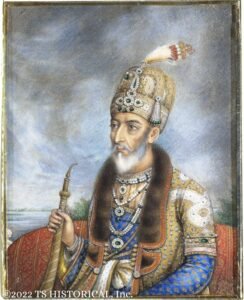Bahadur Shah Zafar: The Final Mughal Emperor and the End of an Era
Bahadur Shah II, commonly known as Bahadur Shah Zafar, was the last emperor of the Mughal dynasty. He lived during a time when his dynasty was declining and British rule was taking over India. Although his power was mostly symbolic, he played a key role in the Indian Rebellion of 1857 and is remembered for his poetry. Even though he was more of a figurehead than a powerful ruler, Bahadur Shah Zafar is still an important figure in India’s history and culture.
Early Life and Rise to Power
Born in 1775, Bahadur Shah Zafar was the son of Akbar Shah II, who was not a very significant emperor. By the time Zafar was born, the Mughal Empire had greatly diminished. Once covering most of the Indian subcontinent, the empire had shrunk due to British expansion and internal problems.
The British East India Company slowly took control of large areas, making the Mughal emperors just figureheads who stayed in their palaces in Delhi.
Bahadur Shah Zafar became the emperor in 1837 after his father, Akbar Shah II, passed away. But unlike previous emperors, Zafar had almost no real power. The British were the ones really running India, while Zafar was just a symbolic leader, limited to the Red Fort and the traditional roles of the Mughal court. Still, even though he had no political or military power, Zafar was respected as a cultural and spiritual leader, especially in Delhi, where he supported poets, scholars, and artists.
A Supporter of the Arts
One of Bahadur Shah Zafar’s most lasting contributions was his support for the arts, especially poetry. Zafar was a talented poet and calligrapher himself. He wrote ghazals, which are poems about love, pain, and mysticism, and had a big influence on the literary world.
The Revolt of 1857: Bahadur Shah Zafar as a Leader
The most important event in Bahadur Shah Zafar’s life wasn’t his poetry or his ceremonial roles, but his unplanned part in the Indian Rebellion of 1857. This rebellion, often called the First War of Independence by Indian nationalists, was a big fight against British rule. It started because of many reasons, like military problems, religious feelings, and social and economic troubles.
By 1857, the Mughal Empire was no longer a strong political power. But the rebels needed someone to follow, so they chose the 82-year-old Bahadur Shah Zafar, even though he was old and didn’t have much power. At first, Zafar was unsure, but he eventually took charge of the rebels. He probably did this because the rebels pressured him, he felt it was his duty, and maybe he had a small hope of bringing back Mughal power.
The uprising quickly grew across northern India, and for a short time, Zafar found himself in the middle of a large movement against colonial rule. The rebels named him the emperor of Hindustan, and Delhi became the main place for the uprising. But even though the revolt was strong, the British East India Company, with its stronger army, was able to stop the rebellion. The Siege of Delhi in September 1857 was the start of the end for both the rebellion and Bahadur Shah Zafar’s rule.
The Fall of Delhi and Bahadur Shah Zafar’s Exile
After the British took back Delhi, Zafar was arrested and put on trial for his part in the rebellion. The trial was unfair, as Zafar, who was already an old and weak man, had never been more than a figurehead for the revolt. Still, the British wanted to make an example of him. Zafar was found guilty of treason, and his two sons and grandson were brutally killed by Captain William Hodson, an event that left a deep mark on history.
Bahadur Shah Zafar passed away in Rangoon on November 7, 1862, and was laid to rest in a simple grave. His death signified the final end of the Mughal dynasty, which had governed India for more than three hundred years. The British ended the Mughal Empire and officially made India a British colony in 1858.
Impact
Although Bahadur Shah Zafar’s rule was not very effective in terms of governing, his influence has lasted, especially in the areas of culture and national pride. As a poet, Zafar is known for his sad poems, which express the emotional and spiritual pain of seeing a long-standing empire fall apart. His poetry, filled with Sufi mysticism, talks about love, loss, and the temporary nature of power.
In the history of India, Zafar holds a special place as a symbol of resistance against British rule. The Indian Rebellion of 1857, despite not succeeding, is often seen as a starting point for later movements for independence, and Zafar played a key role in it.
















































